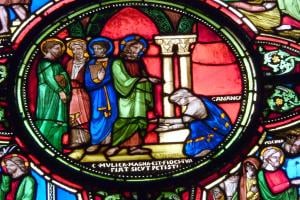
We are called to be holy, and so, to a special kind of purity. We need to make ourselves ready for the presence of God, to welcome that presence in ourselves, so that we can be a proper temple of God. “Since we have these promises, beloved, let us cleanse ourselves from every defilement of body and spirit, and make holiness perfect in the fear of God” (2 Cor. 7:1 RSV). We are to fear God, not in the sense that we think God is some sort of monster who we do not want to anger, but rather, out of love for God:for it is with that love we find ourselves having a fear for disappointing God the same way we fear disappointing anyone else we love. We are to look to God with awe, for then, when we do, we will find ourselves seeking to draw closer to God, and so, to properly make room in ourselves for the presence of God by removing from ourselves anything which would hinder that presence in us. When we do so, we will find we will become holy, and through that holiness, more like God:
What agreement has the temple of God with idols? For we are the temple of the living God; as God said, “I will live in them and move among them, and I will be their God, and they shall be my people. Therefore come out from them, and be separate from them, says the Lord, and touch nothing unclean; then I will welcome you, and I will be a father to you, and you shall be my sons and daughters, says the Lord Almighty” (2 Cor. 6:16-18 RSV).
Just as holiness spreads through contact with something holy, impurity can spread by contact with something impure. As an analogy, consider what happens if we see our car is leaking oil, and we touch the oil: that oil will get all over our hands, and until we wash it off, what our hand touches will also get some of that oil on it. We should avoid being contaminated from what is impure, but we must do so in the right way. That is, we should not look to someone as being a sinner and impure, and in that way, avoid all contact with them, for that would disrespect them and their human dignity. We must not let ourselves lose sight of their dignity by focusing on their sins, using them to demean them and excuse ourselves from loving them. What is unclean are the faults, and if we focus ourselves on them, we begin to touch them and let them influence us, and that is what we must avoid.
Far from ignoring or staying away from those we proclaim to be sinners, we must engage them with love and respect. Looking for what good is in them allows us to look to and hold onto what is good and true, and be influenced by that good ourselves. Thus, when we read Paul talking about separating ourselves from what is unholy, we must not use that to support bigotry or hatred, looking to someone’s sins as an excuse to justify ourselves doing what is wrong such as embracing racism or sexism but rather, it means we are to separate ourselves from those thoughts which get in the way of seeing the natural good of other, the good which often lies behind appearances.
Indeed, loving others is how we will show we are children of God, because in doing so, we imitate God’s love for them. To be sure, sometimes it seems God doesn’t love due to the way God tests us; but God tests us in order to have us better know ourselves and our inherent goodness. This is one of many things which happens in the story of Job. At the end of the book, Job confronts God for all the suffering he endured, and by doing so, he affirmed his value and worth. Despite Job’s friends trying to have Job deny that goodness, God confirmed Job was correct. Job was righteous. Job proved his innate goodness and all those who questioned it were shown to be in the wrong, but the story still has us wondering why God it happened, why God wanted Job to prove himself, and why God wants us to sometimes prove ourselves. Perhaps, it is because it is often necessary for us to be tested to come to know ourselves properly, to know who and what we are, to truly come to terms with our goodness. That is, we will not know who we are until we experience such a challenge. We might think we will do what is right and just, but we do not know we will until we face challenges which tempt us not to. Perhaps, with this light, we can understand what happened when a Canaanite woman came to Jesus asking him to heal her daughter. Jesus was more than willing to do so, but, at first, it did not seem he would; indeed, it seemed Jesus was about to shun her, treat her with contempt, and deny her request; but just like Job, she defended herself, and in doing so, revealed herself to everyone, including herself, her great faith:
And Jesus went away from there and withdrew to the district of Tyre and Sidon. And behold, a Canaanite woman from that region came out and cried, “Have mercy on me, O Lord, Son of David; my daughter is severely possessed by a demon.” But he did not answer her a word. And his disciples came and begged him, saying, “Send her away, for she is crying after us.” He answered, “I was sent only to the lost sheep of the house of Israel.” But she came and knelt before him, saying, “Lord, help me.” And he answered, “It is not fair to take the children’s bread and throw it to the dogs.” She said, “Yes, Lord, yet even the dogs eat the crumbs that fall from their masters’ table.” Then Jesus answered her, “O woman, great is your faith! Be it done for you as you desire.” And her daughter was healed instantly (Matt. 15:21-28 RSV)
In reality, Jesus did not think poorly of her. After all, Jesus is the God-man and he came to the world to show the world God’s love, not just for Israel, but for everyone. However, he used the situation for her to reveal her worth, not only to herself, but to those who watched, that is, those thought less of her because she was a Canaanite. His spoke using the biases many of the Jews had against the Canaanites so she could respond to them, showing she, like the Jews, could come to God with such faith, hope, and love that she was as capable of receiving God’s grace and love as everyone else. He let her speak on her own behalf, but in doing so, she spoke on behalf of all the world, of all those who find themselves rejected by society, showing that they can have great faith in God, indeed, a greater faith than those who would otherwise judge them. She proved her worth; she was willing to humble herself if it meant her daughter was healed. Jesus did not separate himself from her, but rather, he did as she wished, and in the process, verified her true status, one which transcended the way most viewed her.
This, then, is how we should separate ourselves from what is unholy: we should purify our hearts and minds so that we can truly become proper temples of God. To do so, we must learn how to love; when we do so, in and with that love, we will find God is with us and in us, for God is love. We are to become temples of God, recognizing that others, likewise, can be and also are temples of God. We are to honor God in them as we honor God in ourselves. We are to reach out in love and receive the good that is all around us while casting aside all that is impure in us, that is, all that is unlove, disregarding the way such unlove would have us look to the world and act upon it. This is how we are to be holy. Sadly, it is much easier said than done.
Stay in touch! Like A Little Bit of Nothing on Facebook.
If you liked what you read, please consider sharing it with your friends and family!
N.B.: While I read comments to moderate them, I rarely respond to them. If I don’t respond to your comment directly, don’t assume I am unthankful for it. I appreciate it. But I want readers to feel free to ask questions, and hopefully, dialogue with each other. I have shared what I wanted to say, though some responses will get a brief reply by me, or, if I find it interesting and something I can engage fully, as the foundation for another post. I have had many posts inspired or improved upon thanks to my readers.













